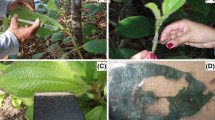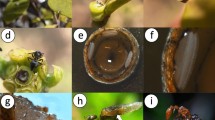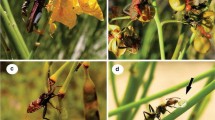Abstract
Many plants are defended indirectly by mutualistic animals. In this field study, we investigated the efficacy of indirect antiherbivore defence in symbiotic and non-symbiotic ant-plant associations in three Macaranga species. We tested whether obligate interactions are more effective than facultative ones by comparing ant-free plants, or parts of plants, with untreated controls. All three species gained significant protection from the ants' presence. The efficacy of defence was higher in the obligate associations represented by M. triloba and M. hosei than in the facultative interaction (M. tanarius). After 40 days of ant exclusion, missing leaf area amounted to 1.7% in M. hosei (compared to 0.2% in untreated, ant-defended controls), 2.6% in M. triloba (controls 1.2%) and 4.2% in M. tanarius (controls 3.2%). In a long-term study of M. triloba and M. hosei, ant protection was orders of magnitude higher than in the short-term results. Short-term experiments obviously are unsuited to obtaining a realistic picture of the long-term efficacy of antiherbivore defence. Within 1 year, ant-free plants lost, on average, between 70% (M. hosei) and 80% (M. triloba) of their total leaf area. Both species appear to require their mutualistic ants for survival. Defence via symbiotic ants is obviously a very effective form of antiherbivore protection. Ants are highly mobile and defend preferentially young, vulnerable leaves and shoot tips, and they fulfil several functions which normally have to be provided by different chemical substances. This may be a general benefit of indirect plant defence, which makes use of "animal-specific" traits rather than intrinsic plant properties.
Similar content being viewed by others
Author information
Authors and Affiliations
Rights and permissions
About this article
Cite this article
Heil, M., Fiala, B., Maschwitz, U. et al. On benefits of indirect defence: short- and long-term studies of antiherbivore protection via mutualistic ants. Oecologia 126, 395–403 (2001). https://doi.org/10.1007/s004420000532
Received:
Accepted:
Published:
Issue Date:
DOI: https://doi.org/10.1007/s004420000532




